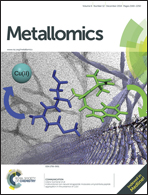A bifunctional non-natural tetrapeptide modulates amyloid-beta peptide aggregation in the presence of Cu(ii)†
Abstract
Amyloid-beta peptide (Aβ) aggregation is one of the hallmarks of Alzheimer's disease (AD), and metal ions such as Cu(II) have been proposed to play a role in amyloid formation and the onset of this progressive neurodegenerative disorder. This study reports the design and characterization of a novel bifunctional non-natural tetrapeptide, Met-Asp-D-Trp-Aib, that is capable of binding copper, competing with Aβ for Cu(II), and modulating Aβ aggregation. The study of this tetrapeptide provides further insights into the role of Cu(II) in the Aβ aggregation pathway, and into the design of compounds with therapeutic potential for Alzheimer's disease.


 Please wait while we load your content...
Please wait while we load your content...